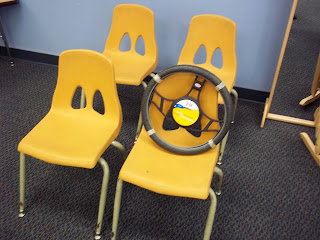Chapter 13: "Play" Is Not a Four-Letter Word
"He's just playing."
"Quit that playing. Do something productive."
"Be serious. Stop playing."
Maybe you've heard phrases like these in adult interactions. Maybe even in connection with preschoolers and children.
Kids are born to play. Play is their job, their occupation.
If that's so, why are so many adults trying to do something else with them?
In this chapter, Rae Pica looks at the push for achievement and accomplishment at the expense of play. "Got to get those kids ready for the real world." But isn't the real world all about problem-solving and exploring solutions? Isn't it about thinking and assessing and doing? All of those things are related to play, especially for younger children.
Rae writes regarding play: "Among the social skills learned are the ability to share, cooperate, negotiate, compromise, make and revise rules, and to take the perspectives of others." Play also helps develop problem-solving, helps kids deal with stress and cope with fears, and develop literacy, math, and creative skills. And much more.
In schools today, adults often tell kids how to use materials or what exactly to do. Too often in my church classroom, a kindergartner will walk up and ask: "What do we do here?" My current response to this: "Look at the materials. What do you think you could do?"
I set up situations and materials in my classroom to suggest ways kids may play, work, and interact. But they should explore and experiment on their own. Recently I set up chairs and a steering wheel as a car. Kids began to drive to various locations and negotiate where to sit. The vehicle needed to be expanded, so we added a couple of chairs. Eventually our vehicle was a large van or bus, allowing seven kids to riding and play at the same time. (The doll made an eighth passenger.)
Kids played out various roles. They used conversation skills. They challenged preconceived ideas. ("A girl is driving?") They discussed any minor conflicts that arose...and involved me when they felt it may be needed. ("Mr. Scott, they are making the baby pee out of the window.")
Play is so important. True play, not directed or orchestrated by adults, is the way that children truly work out their understandings about the world.
And, as Rae says: "I shouldn't have to defend play for children any more than I should have to defend their eating, sleeping, and breathing."
Some links from the book---



